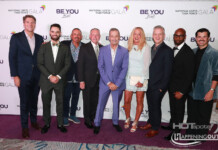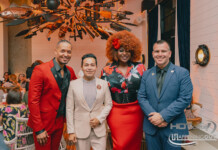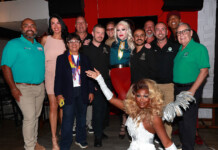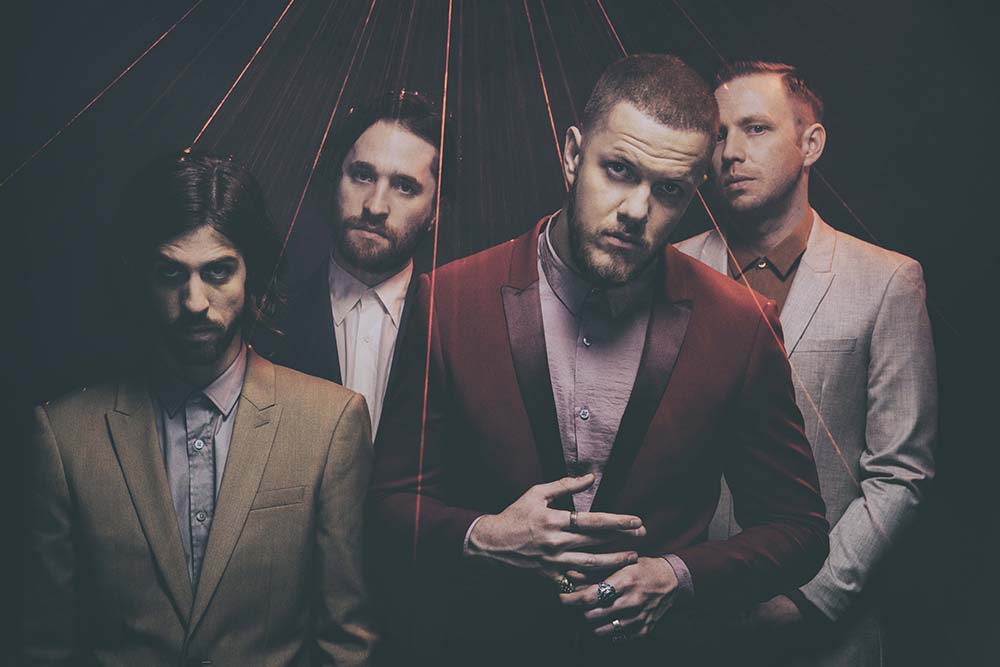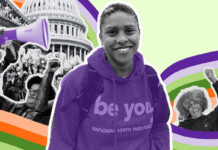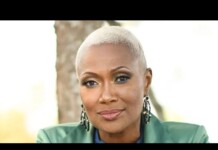During the inaugural LoveLoud Festival in August 2017 on the campus of Utah Valley University in Orem, roughly 40 miles outside Salt Lake City, 17,000 people fell into the embrace of Dan Reynolds. Amid performances of his band’s towering anthems, like “Radioactive,” Reynolds’ message rang loud and clear: Love yourself, and love the young queer people who need it most, unconditionally. Hugs for LGBTQ youth from the Imagine Dragons frontman, recipient of The Trevor Project’s 2017 Hero Award, don’t get much bigger than they did that day.
Except they will, soon.
Reynolds, 30, takes his ally platform seriously, so this year’s second annual LoveLoud Festival, on July 28, will be held in Salt lake City at Rice Eccles Stadium — capacity: 46,000 — and feature performances by Imagine Dragons, Zedd, Linkin Park’s Mike Shinoda, Grace VanderWaal, Neon Trees’ Tyler Glenn, Vagabon, and A.W.
Proceeds will benefit local and national LGBTQ charities, including Encircle, The Trevor Project, and The Tegan and Sara Foundation. Reynold’s foundation serving the LGBTQ community, also named LoveLoud, was launched in 2017 to “bring communities and families together to help ignite the vital conversation about what it means to unconditionally love our LGBTQ youth.”
In mid-April, Reynolds called from a Zurich tour stop to reflect on reconciling his LGBTQ support with Mormonism and reconnecting with gay friends from his youth. He also talked about his doc Believer (playing on HBO this Saturday, July 14, and available on HBO on Demand through July 29) which chronicles his journey from Mormon missionary to passionate LGBTQ activist, and the undercurrent of queerness running through Imagine Dragons’ latest album, Evolve.
LoveLoud started with a phone call between you and Tyler Glenn of Neon Trees, right?
Yeah. We knew each other from a distance because we both served the same Mormon mission, in Omaha, Nebraska. There’s not a whole lot of Mormons in the music industry, so you just kind of know each other. But eventually, I called him, and when he put out his solo record, Excommunication, [in 2016], I connected with him in a lot of ways.
How open to the queer community were you when you first met him?
We were both trying desperately to be textbook Mormons. But I think both of us were finding we weren’t fitting into that box, for different reasons. I got kicked out of BYU, and that really shook me up and threw me down a road of feeling needless shame and guilt.
For Tyler, it was a whole other level, having to live a compartmentalized life and trying to find happiness within the guidelines of an incorrect teaching. It was just debilitating. There was always such a heaviness around him.
I remember when we played a show, he was on stage wearing a sequined shirt and a very kind of glamorous outfit, and somebody in the crowd heckled him. This was before [Tyler] came out, and I remember him saying something from the stage to the extent of, “You don’t know me, and I’m struggling with things right now, and fuck you,” and he flicked off the crowd.
Watching him, what was going through your mind?
I felt what I’ve always felt — since probably seventh grade when one of my best friends was gay and Mormon, and I watched him never want to talk about it because it was so heavy. There were no answers to be had at that young age when you’re raised in a really religious family. It’s hard to find any resolution other than leaving your home or getting kicked out..
I felt super conflicted as a religious person, thinking: I’m supposed to believe all these things, but with it comes this teaching that doesn’t sit right in my heart at all. Even as a 13-year-old, I saw friends conflicted with their sexuality and religion, and I was thinking, “OK, something’s wrong here.”
At the time, were you the support system for them you wanted to be?
They were my friends. I didn’t stop being their friend, but I think we just didn’t talk about it because neither of us had an answer.
I’m a strong believer in the whole “You should live life with no regrets.” But you know, I can’t tell you, honestly, that I don’t have regrets. I wish as a 14-year-old boy I could’ve had the words to say: “Hey, this is not great, and if there is a God and it’s this loving God that we’re taught about, how could we rationally believe that that God would make you have this sense of love that you don’t get to act upon?”
I wish that I had the mental and spiritual capabilities to see that as a kid, but I didn’t. I was dealing with my own guilt complex, with my own sexuality. Even as a heterosexual, a 14-year-old kid in the Mormon Church [is] feeling guilt and shame about masturbation and sex before marriage.
Certainly, on my mission I would’ve hoped to be a 19-year-old kid who had, again, the mental capabilities or life experience to get out of an incorrect teaching, but I didn’t. You’re given a white handbook that tells you the answer to everything. I really do regret that for those two years I turned to a white handbook rather than my heart and my mind, which already knew the answers, ever since I was a little kid.
After becoming this mega-ally rock star, have you been in touch with these gay childhood friends?
Yes, that’s been really one of the most fulfilling, beautiful parts of this process, connecting with them — and them knowing that they have a friend that fully accepts them and loves them and has known them for years. Because you have to be Mormon to understand how heavy Mormonism is.
But yes, [I’ve] connected with two, in particular, and we’ve talked about how they’ve both left the Church because there’s really no safe space for LGBTQ youth within the Mormon Church right now. There’s just not. I wish I could be giving some options to any Orthodox religious LGBTQ kids.
And you are, with LoveLoud. How would you describe being at last year’s premiere LoveLoud Festival?
LoveLoud last year was genuinely my favorite day of my life thus far.
So many people would look in on this and say, “Dan, you should be preaching with your platform: ‘Hey, LGBTQ kids who are raised in Orthodox faith, leave. Get out of the religion.’” And that is actually a very uninformed and unsafe thing to be saying to these kids because a lot of them don’t have a choice. Basically, you’re saying, “Get kicked out of your house, potentially, and put yourself in a more at-risk situation.”
So, the only thing you can do is say: “I love you. I support you 100 percent. And look at all these people who are also religious who also accept and love you. Let us do everything we can do to make a safe space for you.” And that’s what LoveLoud is about.
It was really rad to see a lot of people from very conservative backgrounds of faith, mainly Mormonism, come out, because it was in the heartland of Utah. Some of them came to the festival already having their minds made up [about] what it [means] to fully love and accept LGBTQ youth, but I think a lot of them didn’t, which is really rad.
There were a lot of people who were on the fence: uncles and aunts and parents who didn’t know how to deal with having their child be gay, or their niece or nephew. I know their eyes were opened because I got tons of emails and messages from people saying, “My uncle who had never accepted me at all came to this and walked away and gave me a big hug and said, ‘I understand, and I love you, and I accept you.’”
How does it feel to hear a story like that?
It makes it all worth it, because this is a really difficult line to walk. I’ve had people tell me, “You’ve made so many more kids gay, and this is your judgment day to deal with that.” I read those things, and of course it’s sad. But I know my path. I know my mission, and I know what I’m doing, so it’s OK, ’cause I know there’s just misunderstanding. But yeah, those letters mean a lot. They fire me up.
What are you most looking forward to about this year’s festival?
That it’s much, much bigger is exciting. We did 20,000 last year, and this year we’re doing a stadium, so it’s like 40,000. The artists are bigger. And just watching how it spread very organically within the religious community [is exciting]. It sparked so much dialogue. Mormon after Mormon hit me up and would be like, “I was at church, and someone gave a talk about LoveLoud, and there was this big argument about whether it’s OK to have your child go to it or not,” and I’m like, “Awesome.”
That dialogue that’s taking place at home about LoveLoud is what needs to be happening. LGBTQ youth are eight times more likely to take their lives when they’re not accepted in their homes or community. That statistic alone is just devastating.
Do you write songs with the queer community in mind?
Definitely on Evolve. Three songs were produced with [gay producer-songwriter] Justin Tranter, who’s one of the biggest activists in the queer community. Justin was certainly inspiring to me. As we were writing songs, there was a need to make sure that these lyrics were going to reach queer youth — that they would know, “Hey, this is for me.” I think Evolve has it speckled all through it, whether it’s just the album artwork — the rainbow on the front — or the lyrics.
There’s a pretty iconic photo of you holding a rainbow flag at Lollapalooza Brazil Festival in March. Tell me about that moment.
Brazil is an interesting place because it has a lot of people who want change. I believe their Pride parade is [the biggest] anywhere in the world, but [Brazil’s] still a very unsafe place for LGBTQ youth. So, I committed this tour to do everything I can to bring as much color and pride to the stage as a straight man possibly can.
Based on some headlines after that gig, the gay community also didn’t seem to mind the shirtlessness.
[Laughs.] Hey, I love it. This whole process has also been my process of coming into my own self and embracing sexuality, period. And celebrating life and celebrating love.
What do your parents, who declined to be in your documentary, Believer, think of the film?
I sent the movie to all my family because I [didn’t want it to] be an awkward thing in the family. My mom and dad came to the premiere
That’s huge.
It was huge. They’ve all been really loving and supportive of what I’m doing. But, yeah, there have been rough moments — definitely, during the beginning of it, when I was just getting into it — arguments here and there within the family.
It’s tricky because I love my family, and I wanna respect their privacy. Like I said, my mom and dad came to the premiere, and that meant a lot. And my uncle — he’s gay and Mormon and moved out of the United States years ago because he felt like there was no place for him — I got to talk to him. And I haven’t seen him since I was 8 years old. That was the only uncle I didn’t ever get to know, my gay uncle, because he felt like he couldn’t live his true life without moving a country away.
I don’t know. It’s baby steps for me. I know that everybody has their own way of coming around to certain things, and it takes time. But the question is: How long will it take? And how many lives will be lost or saved along the way?



